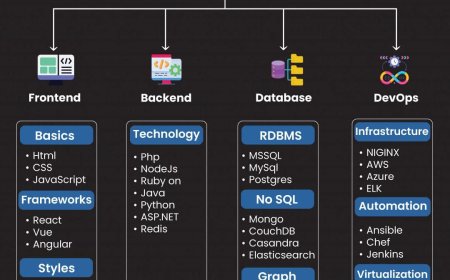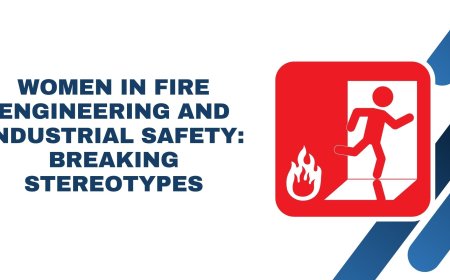How the Advanced Diploma in Industrial Safety Helps You Prepare for Safety Audits
One of the most effective ways to build expertise in this domain is by pursuing an Advanced Diploma in Industrial Safety (ADIS). This program is specially

In todays dynamic industrial landscape, safety audits have become a fundamental requirement to ensure compliance with national and international safety standards. Industries across sectors, from manufacturing to oil and gas, construction to pharmaceuticals, must maintain high safety standards to protect workers, equipment, and the environment. As safety becomes a critical operational pillar, the demand for trained safety professionals has skyrocketed.
One of the most effective ways to build expertise in this domain is by pursuing an Advanced Diploma in Industrial Safety (ADIS). This program is specially designed to equip professionals with the knowledge, skills, and practical training needed to oversee and execute safety management systems, particularly in the context of safety audits. Lets explore how the Advanced Diploma in Industrial Safety prepares you for safety audits and enhances your career prospects in occupational health and safety.
Understanding Safety Audits
Before diving into how the diploma helps, it's important to understand what a safety audit entails. A safety audit is a systematic review of an organizations health and safety procedures, policies, and practices. It helps identify risks, gaps in compliance, and areas of improvement. There are different types of audits:
-
Internal Safety Audits
-
External/Third-Party Audits
-
Regulatory Compliance Audits
-
Behavior-Based Safety Audits
Each of these audits requires thorough documentation, evaluation, and reporting, skills that are central to the ADIS curriculum.
Core Curriculum That Aligns with Safety Audit Requirements
The Advanced Diploma in Industrial Safety is structured to provide a deep understanding of occupational health, industrial hazards, risk assessment, and legal compliance. Heres how the course content directly supports preparation for safety audits:
1. Regulatory Compliance and Legal Frameworks
Safety audits are heavily focused on checking compliance with applicable laws and standards such as:
-
Factories Act, 1948
-
OSHA regulations
-
Environmental Protection Act
-
National Building Code
-
ISO 45001:2018 (Occupational Health and Safety Management Systems)
The ADIS program teaches students about these laws and how to interpret and apply them in real-world scenarios. This legal knowledge is crucial during audits, especially when identifying non-compliance or recommending corrective measures.
2. Risk Assessment and Hazard Identification
A major part of any safety audit is evaluating potential risks and hazards in the workplace. Through case studies and simulated environments, the diploma trains students in:
-
Job Safety Analysis (JSA)
-
Hazard and Operability Studies (HAZOP)
-
Fault Tree Analysis (FTA)
-
Failure Mode and Effect Analysis (FMEA)
These tools and techniques help safety officers anticipate risks and recommend solutions proactively, skills essential during safety inspections and audits.
3. Safety Management Systems (SMS)
An effective safety audit evaluates how well an organization has implemented a Safety Management System. ADIS students learn how to:
-
Develop and maintain a robust SMS
-
Set up Emergency Response Plans
-
Conduct safety training and drills
-
Monitor Key Performance Indicators (KPIs) for safety
This knowledge empowers professionals to not only face audits confidently but also guide organizations through the process with a structured safety approach.
4. Mock Audits and Simulation Training
Many ADIS programs include mock safety audits as part of their training module. These simulations prepare students for real-world scenarios where they:
-
Conduct walkthroughs
-
Check safety documentation
-
Identify gaps
-
Prepare audit reports
Mock audits help build confidence and develop the observational skills needed to assess safety protocols under pressure.
5. Documentation and Report Writing
Safety audits involve a heavy load of paperwork. From safety policies to incident records, everything must be meticulously documented. ADIS courses offer training in:
-
Preparing audit checklists
-
Writing non-conformance reports (NCRs)
-
Documenting corrective and preventive actions (CAPA)
-
Maintaining safety records as per ISO and regulatory standards
Being able to maintain clear and accurate records is crucial during both internal and external audits.
Soft Skills and Communication
6. Interpersonal and Communication Skills
Conducting or assisting in a safety audit requires strong communication and interpersonal skills. Safety officers must interact with workers, supervisors, and auditors to gather information and implement improvements.
ADIS programs incorporate soft skills training, helping students:
-
Conduct interviews with employees
-
Present safety data to management
-
Educate staff on safety protocols
-
Negotiate solutions to identified hazards
These skills are vital for audit success, where collaboration is key.
Industry-Relevant Certifications and Case Studies
7. Exposure to Real-World Case Studies
Most ADIS programs provide in-depth case studies from various industries, including:
-
Construction
-
Oil & Gas
-
Chemical manufacturing
-
Power plants
By studying these real incidents and audits, students learn what went wrong, what was overlooked, and how audits helped improve safety. This hands-on knowledge is incredibly valuable when stepping into audit situations.
Career Benefits of Audit Training Through ADIS
Completing an ADIS program with a strong focus on audit preparation can open doors to diverse career roles:
-
Safety Officer
-
EHS Auditor
-
Risk Management Consultant
-
HSE Manager
-
Compliance Officer
Moreover, companies often prefer hiring candidates who have audit training because it reduces the risk of fines, penalties, and operational shutdowns due to poor safety performance.
Why ADIS is Crucial for a Future in Safety Auditing
To summarize, heres how the Advanced Diploma in Industrial Safety equips you to manage safety audits effectively:
? Thorough understanding of laws and standards
? Hands-on training in risk assessment and control techniques
? Experience through mock audits and case studies
? Ability to draft and maintain safety documentation
? Strong communication and leadership abilities
? Awareness of global and industry-specific best practices
Note: For career growth visit best Institute of Fire Engineering and Safety Management
Conclusion
In industries where safety is paramount, being well-prepared for audits is not just a regulatory requirement, it is a moral and professional obligation. The Advanced Diploma in Industrial Safety bridges the gap between theoretical safety principles and their practical application in audits. It doesnt just teach you to pass an audit, it trains you to lead one.
For professionals aiming to work in safety-critical roles or aspiring to become safety auditors themselves, ADIS is an essential stepping stone. With growing emphasis on sustainability, ESG compliance, and worker welfare, the ability to successfully navigate safety audits is a competitive advantage that the Advanced Diploma delivers with precision.
Whether youre a recent graduate, an engineer, or an experienced professional, enrolling in the ADIS program can elevate your understanding of safety audits and set you on a path to long-term success in the field of occupational health and safety.























